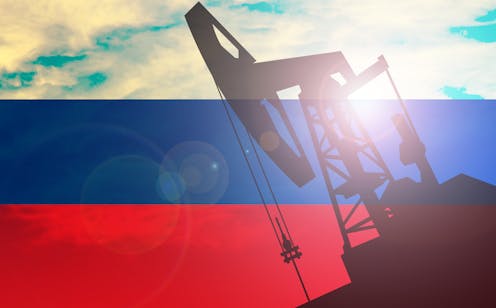Why Russia still has Europe over a barrel when it comes to oil supply
- Written by Slawomir Raszewski, Senior Lecturer, Royal Docks School of Business & Law, University of East London

Oil and war have been inextricably linked for decades, and Ukraine is no exception. And as the west seeks to put ever greater economic pressure on Vladimir Putin, the US announced a ban[1] on importing Russian oil.
The UK government said[2] it too would aim for a similar stance. And while the EU may also wish to follow this path, it is harder for a country to boycott Russian oil if it has no alternative supplier.
The US and the UK for example, have recently been importing only around 8% of the oil[3] they use from Russia. For Germany, that figure is 35%[4]. For Poland it is 85%, and for Hungary, 90%.
Overall, while the EU is even more dependent[5] on Russia for its natural gas, the bloc still relies on the country for around a third of the oil it needs. And getting it from elsewhere is far from simple.
This is partly because all oil is not the same – and refineries rely on specific grades of oil to make the products their customers need. Europe’s refineries will not all be able to switch to processing alternative supplies fast enough.
This is much less of a problem in the US, which as the biggest oil producer[6] in the world[7], can afford to be much less reliant on foreign imports. The rest of the world is not so fortunate.
Indeed, much of Russia’s economic might comes from its position as the third largest oil producer, and the world’s biggest exporter. It makes[8] 11.3 million barrels per day, of which 7.1 million are exported, including 1.6 million to its biggest customer, China.
So which countries could step in to support a wider boycott of Russian oil? Out of the world’s total reserves, the largest deposits are controlled by a handful of nations including Venezuela (17.5%), Saudi Arabia (17.2%) and Iran (9.1%).
All of these are members of the Organization of Petroleum Exporting Countries (Opec), which has signalled[9] it has no plans to ramp up production. (Russia is a member of an expanded group called “Opec+”.) And even if they did, some analysts suspect[10] that Opec spare capacity – additional production that can swiftly be brought to the market – is no more than roughly 3.2 million barrels per day.
Nevertheless, there have been diplomatic approaches[11] by the US government to Venezuela and Iran with a view to normalise relations and enable additional oil supplies on international markets.
But while Venezuela’s oil reserves are extensive, its production capacity has declined over the years[12]. Only a relatively small volume of supply (up to 0.6 million barrels per day) are expected in the short term.
As for Iran, some hope that ongoing nuclear talks in Vienna[13] could provide an incentive for the country to increase production. Yet any final agreement there would require the nod from Russia, as it remains a party to those sensitive negotiations.
Further afield, and regardless of Opec’s stance, suppliers are not in a position to easily replace Russian supplies. For despite current high prices[15], the industry has been severely bruised by COVID with almost two unsettling years of reduced demand, lower prices and reduced investment.
Now with pandemic restrictions receding around the world, demand has started to grow again, pushing up the price, and providing a chance to make up for the lost revenue. Any spare capacity that does become available is likely to be snatched up quickly, particularly by states in the world’s most energy-hungry region[16], south-east Asia[17].
In the short term then, despite wishing to make Putin suffer economic pain, many European countries will find it almost impossible not to rely on him for their oil. Further ahead, they will doubtless seek ways[18] to reduce dependency and the amount of Russian oil they buy, while longer term, the transition to nuclear and renewable energy is likely to be accelerated.
But for now, the high price[19] of oil, driven by a mixture of modern geopolitical tensions and old fashioned supply and demand, means huge revenues for Russia – and a reliable source of income for Putin’s war chest.
References
- ^ announced a ban (theconversation.com)
- ^ said (www.gov.uk)
- ^ oil (www.ft.com)
- ^ figure is 35% (www.pism.pl)
- ^ more dependent (theconversation.com)
- ^ biggest oil producer (www.ig.com)
- ^ in the world (www.bp.com)
- ^ It makes (www.washingtonpost.com)
- ^ has signalled (www.ft.com)
- ^ some analysts suspect (www.reuters.com)
- ^ diplomatic approaches (indianexpress.com)
- ^ over the years (www.iai.it)
- ^ talks in Vienna (www.internationalaffairs.org.au)
- ^ Shutterstock/Maxx-Studio (www.shutterstock.com)
- ^ current high prices (www.cityam.com)
- ^ energy-hungry region (www.weforum.org)
- ^ south-east Asia (www.reuters.com)
- ^ seek ways (ec.europa.eu)
- ^ high price (theconversation.com)







